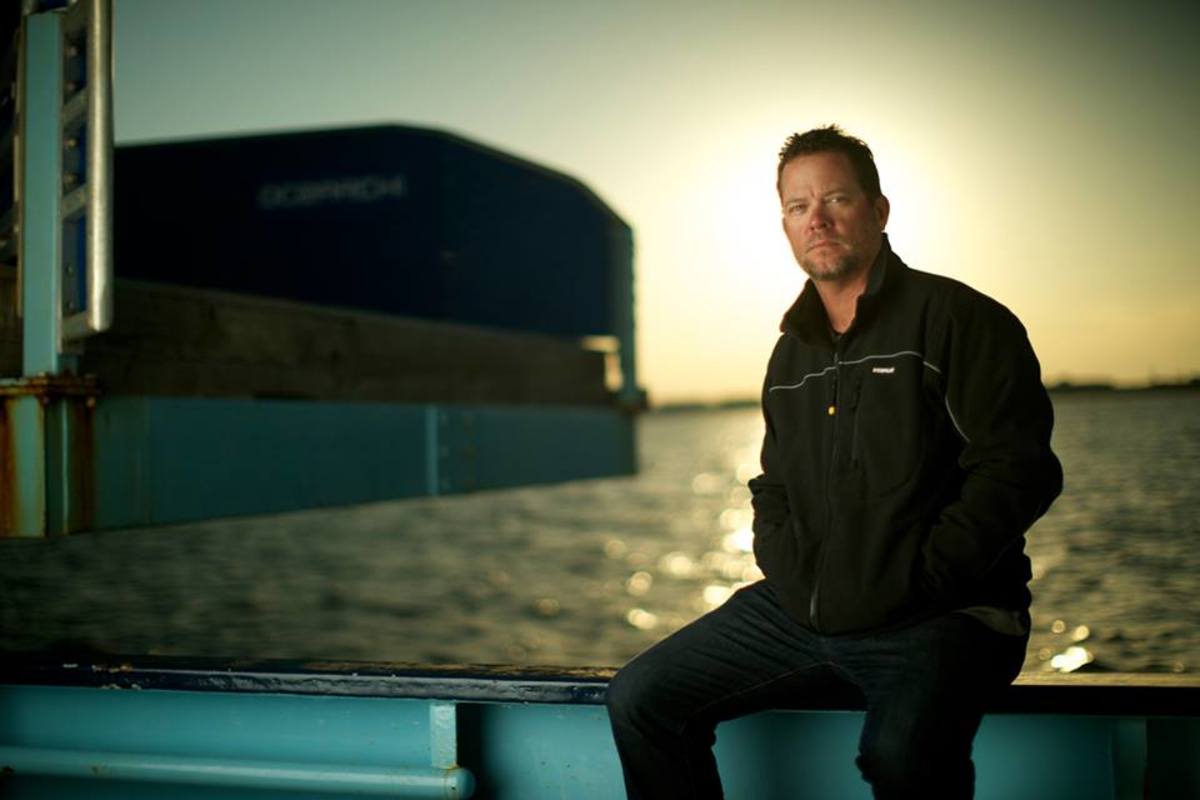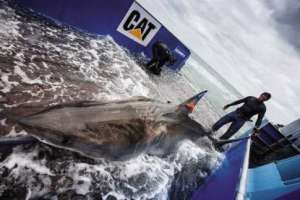
Photo courtesy OCEARCH Facebook
Chris Fischer, the first person to ever tag and track fully grown Great White sharks, spoke on Nov. 6 to a sold out audience of over 700 people about ocean life conservation.
Fischer is the founder and chairman of the non-profit research organization OCEARCH and host of numerous TV shows, including the two-time Emmy winning ESPN program “Offshore Adventures.”
Fisher has led 20 expeditions around the world tagging Great White sharks to track their migration patterns. This is to help scientists better understand the animals so they can work to conserve their populations.
“I didn’t really choose great whites, I think sharks chose us,” Fischer said.
Through his show for ESPN, Fischer said he worked with a shark researcher who explained that, if sharks were to go extinct, all other fish species would follow. The is because the sharks eat the fish preying on other species of fish and their offspring. Without the balance the sharks bring to the ecosystem, the entire chain would collapse.
Fischer said 250,000 sharks are killed every day, mainly to harvest their meat and use it in shark fin soup. That means hundreds of millions of sharks a year.
When speaking to the researcher, Fischer said there was a severe lack of data on Great Whites – data they needed to figure out their plan of action for conservation.
Seeing a need for more data, Fischer sold his house, put his belongings in storage, bought a boat, put together a team and set out to capture and tag sharks.
He provided the data to scientists for free. Never before had fully mature Great White sharks been captured, tagged and released back into the wild to be studied.
Fischer said, “We believe inclusion is inspiring and you know speaking at the school here is great because you know we’ve worked with UNF on multiple expeditions.”
Fischer stressed the importance of freely sharing knowledge to help scientific studies. He said this is the biggest highlight of his work.
“Anything is possible when you do not care who gets the credit.”
The proof is in the pudding – the Discovery Channel approached Fischer, asking to include him in their online learning platform available to those willing to pay for it. He agreed, provided they would make his entire section free to anyone interested, and they did.
Lydia: “the ultimate needle in a haystack”

Photo courtesy OCEARCH
Fischer said one of his rarest finds was right here on the coast of Jacksonville, when he tagged a 2,000 pound Great White named Lydia.
She has provided researchers with the first evidence of a Great White migrating across an entire ocean and is expected to answer the question of where these sharks breed in the coming months.
Fischer said, “Of all the expeditions, the 20 from around the world that we’ve conducted, no place greeted us and loved on us and made us feel more welcome than the city of Jacksonville, and so to be able to come back and report in on what we’ve learned and share and be inclusive with this community is particularly rewarding.”
Fischer said the UNF marine biology department is an asset to North Florida and the community. He said, “We’re thrilled to have them on the OCEARCH North Atlantic white shark science team.”
Jordan Johns, a senior at UNF and a biology major who attended the lecture, said, “Our big focus is coastal biology and part of that is shark ecology. We have quite a few professors, or at least one that I know, [who] focuses his research on that, so it’s a great opportunity to see someone who’s famous worldwide and brings it right back here, home in Jacksonville.”
Caitlin Joyce, a junior majoring in English, said,“I think it’s a really good idea that people get information on wildlife they don’t think about everyday and, by him coming, he can inform people on marine life animals and why they’re important to keep around.”
Fisher said he remains optimistic that his and other researchers’ efforts will be able to prevent the extinction of the world’s sharks and preserve the ocean’s ecosystems for generations to come.
“I think everyone is starting to see that the ocean, and the planet, [are] not just an unlimited source of resources, that we’re all looking at it differently and thinking more sustainably,” Fischer said.
Fisher is currently planning an expedition to Australia to work with tiger sharks and plans to return to Jacksonville in 2016.
This provides more information about Fischer’s work and organization; the website even includes a shark tracker.
Gallery photos courtesy of OCEARCH’s Facebook
Email Jake Stofan at reporter12@unfspinnaker.com







